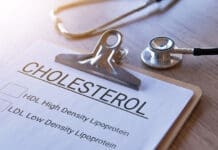 By Kay Leaman, HealthyDay HealthyLife
By Kay Leaman, HealthyDay HealthyLife
The thyroid is located at the base of the neck just below the Adam’s apple. Hormones produced by the thyroid control energy, metabolism, heart rate, protein synthesis, cholesterol and triglyceride metabolism, bone metabolism, sleep, brain functions and more. It is not uncommon for a misdiagnosis to be given (hypo) as there are other issues that cause the thyroid to be compromised. That being said let’s look at the two main issues:
HYPERthyroidism, also called overactive thyroid, occurs when there is an overproduction of the thyroid hormone call thyroxine (T4). Symptoms include unexpected weight loss, tachycardia (rapid heartbeat) nervousness, anxiety/irritability, fatigue or muscle weakness, plus up to 10 other symptoms.
Treatments depend on the cause. One treatment is radioactive iodine which is used to slow production. Some causes allow for the thyroid issues to improve without treatment. Supplementation does not affect this disease.
A few causes are:
• Grave’s disease: autoimmune disorder which causes the immune system to attack the thyroid.
• Thyroiditis: the gland becomes inflamed; the reasons are unclear. This can cause extra thyroid hormones being stored to leak into the bloodstream causing symptoms of hyperthyroidism.
• Complications: Heart: atrial fibrillation and congestive heart failure, brittle bones, vision problems, discolored or swollen skin
HYPOthyroidism is a deficiency in the secretion of thyroid hormones resulting in a reduction of normal functions if not all of the body’s cells and tissues. When this glad is under-active, cells can’t properly take in macro & micro nutrients nor receive adequate oxygen. It also causes cellular toxic waste not to be eliminated efficiently. Less than 50% of the population suffers with some degree of hypothyroidism and affects women more than men.
Possible symptoms which can be confused with normal aging is a long list (To request this list, email me with Thyroid Symptoms in the Subject line.).
Thyroid hormones are T3, T4 and Calcitonin (regulation of blood calcium and bone metabolism). T3 has 3 iodine atoms; T4 has 4.
Other causes are:
1. Inflammatory disorder – autoimmune disorder – Hashimoto’s thyroiditis most common in developed nations (otherwise it’s iron deficiency) and may be triggered by a hyper-permeable intestinal lining known as leaky gut syndrome
2. Leaky Gut
3. Genetics
4. Poor diet
5. Hormone imbalances
6. Pregnancy
7. Psychological stress
8. Inactivity
For a complete picture of thyroid activity, request these six tests:
• TSH (reference ranges .3-3.0 NOT .5-5.0)
• Free T3
• Free T$
• Reverse T#
• Thyroid antibodies (TPO Ab)
• Thyroglobulin Antibodies (Tg AB)
 Natural support:
Natural support:
• Grape Seed extract and other polyphenolic antioxidants (essential component of the protocol for autoimmune and inflammatory diseases as these have oxidative damage in its pathogenesis).
• Probiotics
• Iodine: 250-300 micrograms cause a significant improvement in alleviating hypothyroidism. Because many of us have moved from iodized salt to more natural salts (sea salt), supplementing with a quality iodine can cause significant improvement in alleviating hypothyroidism.
• Foundation of vitamins minerals and omega-3 fatty acids
As with any ailment, we are all at risk of developing a thyroid disorder. Continuing to develop a healthy lifestyle and improving it as we learn will continue to offer us many benefits.
Here’s to Health!
succeed.hdhl@gmail.com























































